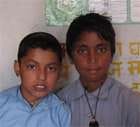Dadagaun is a village in the Jitpur community of 146 households and with a population of 730. When VIN started their work in the region, Dadagaun, was a village, where not many of the families had access to sanitary facilities. This meant it was a big priority for VIN to begin building toilets in the village. Now all the families in the village have toilets. They also constructed toilets at the local school, as well as constructing a fence around the school. This helped preventing the children from defecating in the school premises and also provides security, since the school is located on the edge of a hill.
Dadagaun School is located very beautifully on top of a hill. The condition of the school now is like most schools in Nepal. It is small, but clean and safe for the children. There are now two toilets in the school, one for teachers and one for children. Both of them are located away from the classrooms, to limit the smelling issues related with toilets located close to classrooms.
This was not the situation before. The school had just one single toilet. But the toilet had been constructed badly, without a door and would fill up fast. This meant that the toilet was not used and instead the children went down the hill, to do their business, or inside of the courtyard of the school.
The school therefore had many health issues, and the teaching environment was bad for both teachers and children. The children suffered from diarrhea and skin allergies associated with unsanitary conditions. Both children and teachers felt bad coming to the school, but they still came. I was very surprised to learn that the children did not skip classes. “When we had no toilet at school, I had diarrhea and skin allergies, but I still liked coming to school, because it was close to my home and my friends were here.” – Bikash Devkota, Class 5 Dadagaun School. He also told me, that he had trouble concentrating on his studies when he was in school.
The teachers tried to teach the children about health and sanitation, but it was difficult getting them to understand, when they did not have the proper facilities. When VIN and the government supported toilets were built, there was an adjusting period. The teachers had to teach the children, about how to use the toilet, to ensure that the children used it. Now the school is clean and the smell is gone. You would not think by looking at the school now, that it had once been full of feces. Now both children and teachers like coming to school. “People helped build the toilets, every student now goes to the toilet, and we have a good environment here, because the children knows how to use the toilet.”- Bidhya Phuyal, Teacher at Dadagaun School.
One of the things, that made it difficult for the teachers, to make sure the children actually, used the newly constructed toilets, was that they had never used a toilet before in their lives. They had not had toilets at home either. But when VIN started their projects, this was soon about to change.
VIN started constructing toilets in Dadagaun in 2009 and continued the construction until 2012. The toilets have been constructed by the families with help from VIN volunteers. VIN also conducted training for the families, on how to use the toilets correctly, and the importance of using the toilet, and not continuing using holes near their houses.
I talked with a woman, who had been using a hole in a hill near her house. She told me that she and her family had decided, to locate the hole there, because it was away from the house, and they thought it was more sanitary, but it still smelt very bad. She herself was not sick, due to the lack of sanitary facilities, she actually told me, that she has never used medicine in her life. But her family was sick, they just as the children at the school, suffered from diarrhea and skin allergies. But now since the construction of the toilet, they have not been sick. “The toilet is better than the hole, because of a better environment, no bad smell and more privacy. House flies are controlled and we are not sick anymore.” – Sirjana Shrestha, Dadagaun
As mentioned earlier in the article, the change of the people’s health did not only come from, the construction of toilets. There are many cases, where there has been built toilets, but they are being used for other purposes, like storage and even sleeping. The change here in this community, came not only from the construction of toilets, but also the education VIN did. From the education, people learned about basic hygiene, and the many reasons why a toilet is better both for their health and the beautiful environment of their village. VIN has not only constructed toilets, and educated people about health and hygiene in Dadagaun, but also in other villages of Jitpur. In total they have constructed 180 toilets in all of Jitpur, 21 of the toilets constructed in Jitpur, have been constructed by the families themselves, on their own initiative. This shows how we can make a difference, by teaching and inspiring others to follow suit.
VIN hopes that by 2015 there will be 400 more toilets built. 200 more in Jitpur and 200 in Okhladhunga, where VIN has just recently started projects. If you want to help achieve this goal, you can either donate on the website or volunteer for VIN. When volunteering you have the option, of doing the actual construction, or you can choose to help educate the people on the importance of toilets.
Written by Isabella Jakobsen Danich intern at VIN for the Health Programm

| Name: | Dandagaun Becomes Open Defication Free Village ! |
| Project Category: |

 Member of
Member of